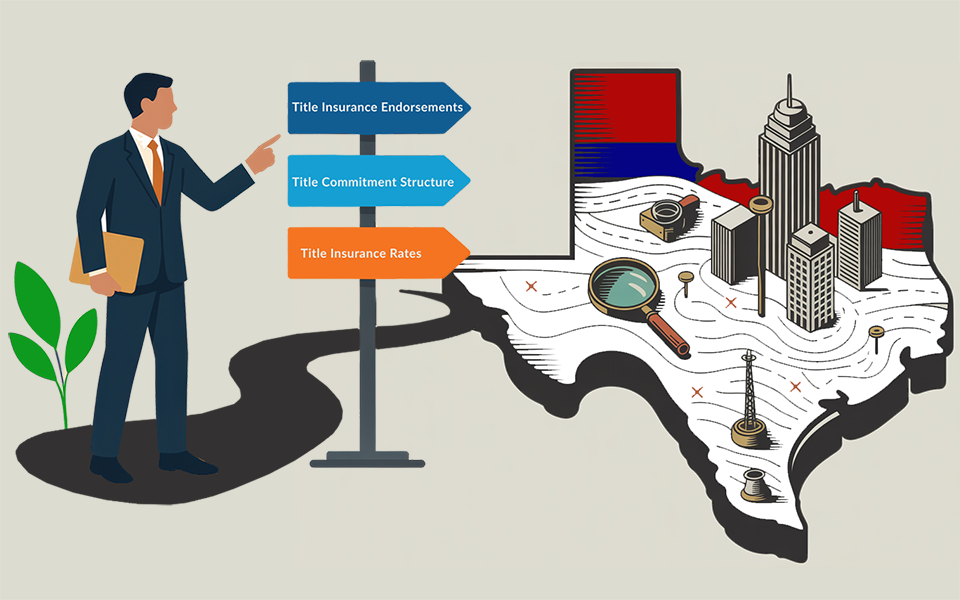December 22, 2025
Top 10 Municipal Red Flags That Can Delay Your Closing (and How to Fix Them)

Real-estate contracts are filled with dates, deposits, and delivery deadlines. Yet even when buyers, sellers, and lenders stay on schedule, local government requirements can still throw a wrench in the works. Municipal red flags, such as open permits, unpaid utility bills, and looming code violations often surface late in the game and bring closings to a standstill.
This article walks you through the ten most common municipal pitfalls, shows you how to identify them early, and provides practical solutions. Use it as a checklist for smoother transactions and fewer last-minute surprises.
Why Municipal Issues Deserve Early Attention
Title searches and tax certificates reveal a lot about a property, but they rarely capture every municipal twist. Permitting or code problems can be outside the public records that your settlement agent typically reviews, and they often only become apparent after a formal lien search or direct inquiry with the city or county.
Delays cost money, including rate-lock extensions, storage fees for household goods, per-diem penalties, and even contract cancellations. Early discovery gives you bargaining power, extra time to cure defects, and a clear path to the closing table.
Red Flag 1: Open or Expired Building Permits
Risk
Work that never received a final inspection may violate local code. Some jurisdictions refuse to issue a certificate of occupancy until the permit is closed, potentially blocking loan approval.
How to Detect It
Many cities host online permit portals. If not, request a municipal lien and permit search or contact the building department directly.
Fix
Hire a licensed contractor to finish the job, schedule an inspection, and obtain sign-off. For older work that can't be inspected, request a "no further action" letter from the municipality, which states that they will not pursue enforcement.
Red Flag 2: Active Code-Enforcement Violations
Risk
Daily fines accrue quickly, and in some places, a sale cannot proceed until violations are cleared.
How to Detect It
Look up the address in the code enforcement database or contact the department. Neighbors' complaints are also recorded there.
Fix
Submit a corrective-action plan, complete the repairs, and request a compliance inspection. Pay any outstanding penalties once the violation is lifted.
Red Flag 3: Delinquent Property Taxes
Risk
Unpaid taxes can trigger the sale of a tax certificate, which can escalate into a tax-deed foreclosure if left unaddressed.
How to Detect It
Search the county tax collector's website and request a payoff statement through the closing team.
Fix
The seller should pay the balance in full and provide a receipt that is stamped. Confirm the payment posts before closing to avoid escrow complications.
Red Flag 4: Outstanding Utility Balances or Utility Liens
Risk
Water, sewer, or trash departments attach liens that often survive foreclosure, making the new owner responsible.
How to Detect It
Request a final payoff or zero-balance letter from each utility provider. In some regions, this requires a written form.
Fix
Settle the account and keep the letter for the closing file. If billing overlaps with the settlement date, prorate the charges.
Red Flag 5: Special Assessments for Public Improvements
Risk
Citywide road or sewer projects can result in a lump-sum assessment due at closing or a long-term installment that the buyer inherits.
How to Detect It
Check the municipality's assessment roll or call the finance office. Tax bills often list upcoming assessments separately.
Fix
Negotiate who pays what in the purchase contract. If the buyer assumes the payments, verify the amortization schedule and interest rate.
Red Flag 6: Zoning Non-Compliance or Use Violations
Risk
Illegal garage apartments, setback encroachments, or parking deficiencies can prevent future renovations and trigger fines.
How to Detect It
Order a zoning verification letter and compare the current use, site plan, and occupancy type against zoning-code requirements.
Fix
Apply for a variance, correct the violation, or adjust the deal terms to allow extra time. In severe cases, consider walking away.
Red Flag 7: Unpaid Municipal Fines for Minor Infractions
Risk
Tickets for tall grass, trash piles, or noise often convert to liens if left unpaid.
How to Detect It
Search the clerk of courts' fine ledger or request a code-enforcement statement.
Fix
Pay the fine and secure a satisfaction release. If the citation was issued in error, file a timely appeal.
Red Flag 8: Unrecorded Development or Infrastructure Agreements
Risk
Developers sometimes sign cost-sharing deals for sidewalks or drainage that mature years later. Because they are not always recorded, they may stay hidden until a diligent inquiry is made.
How to Detect It
Review subdivision documents at the planning department and ask staff about pending obligations.
Fix
Confirm balances or deadlines in writing, then negotiate a seller payoff or escrow holdback.
Red Flag 9: Pending Condemnation or Demolition Orders
Risk
If a building is deemed unsafe, the municipality can halt transfers or demand a sizable repair bond.
How to Detect It
Check public-notice boards, annual lists of unsafe structures, or speak directly with building safety officials.
Fix
Negotiate who will correct the deficiencies and post any required bond. Alternatively, require the seller to cure the order or discount the price to reflect the risk.
Red Flag 10: Certificate of Occupancy (CO) Problems
Risk
Major remodels or a change in use (for example, a single-family home converted to a duplex) require an updated CO. Without it, many lenders refuse funding.
How to Detect It
Search the address in the building department's CO lookup or request records in person. Compare the approved use with current conditions.
Fix
Schedule final inspections, submit as-built plans if required, and pay any re-inspection fees as applicable. In older buildings, a temporary CO might be available while corrections are underway.
Tips for Communicating with Local Agencies
- Use the official request forms posted by each department; generic letters are often rejected.
- Keep phone numbers handy, then follow up a day or two after sending documents. Response times vary widely.
- Maintain a written log of every conversation, including the date, staff member's name, and promised turnaround time. This record is invaluable when deadlines loom.
When to Bring in Outside Specialists
- Real estate attorneys handle complex zoning, condemnation, or large-scale special assessment negotiations.
- Licensed contractors are essential for closing open permits or addressing structural code issues.
- Tax or assessment consultants can evaluate hefty public-improvement charges and sometimes reduce the total owed.
- Title Support Companies: Skyline Title Support's team handles the legwork with city and county offices, chases down zero-balance letters, and keeps you updated so your closing timetable stays intact.
Key Takeaways
Municipal red flags rarely solve themselves. The earlier you order a thorough lien search, the more options you have to cure defects, shift costs, or even renegotiate price. Build the checklist above into your workflow, maintain open lines with city and county staff, and enlist the right professionals when problems grow beyond a quick fix.
A well-timed bit of property due diligence keeps the transaction on track and preserves relationships with clients who rely on you to guide them through the process.
Related Posts
2026 Title Industry Outlook: Top 10 Trends That Will Redefine Due Diligence and Closings
The title industry is heading into 2026 with more moving parts than at any time in recent memory: rapid regulatory change, deeper fraud risk ...
December 22, 2025
Beyond the Basics: Navigating Title Complexity in Texas Commercial Real Estate
Last spring, a Dallas investor was three days from closing on a mixed-use development site when the title examiner discovered something unusual ...
December 22, 2025
Witchy Titles & Cursed Closings: What Salem’s History Can Teach Us About Real Estate Due Diligence
In 1692, the town of Salem, Massachusetts descended into chaos. Fueled by fear, rumors, and suspicion, dozens of people were accused of witchcraft and ...
December 22, 2025
Title Under Siege: A First Look at Our New Guide to Deed Fraud and Seller Impersonation
Seller impersonation, in particular, is on the rise. In these cases, a scammer poses as the property owner—usually targeting vacant land, rental...
December 22, 2025
Real Estate Due Diligence Checklist: 9 Hidden Costs That Kill Closings
Imagine this: A $3.2 million Miami Beach home sale implodes because of a $127 unpaid utility lien that no one caught in time. Absurd as it sounds ...
December 22, 2025
Land Surveys vs. Title Searches: When You Need Both (and How to Budget)
Picture this: you’re days away from closing on a home when an unexpected hiccup surfaces. The seller’s old fence sits two feet inside the neighbor’s...
December 22, 2025
How Can Large Title Companies Thrive in Volatile Times?
When mortgage rates climbed to 23-year highs in late 2023, one national title insurer watched transaction volume plummet 45% over eight weeks yet ...
December 22, 2025
Summer Real Estate: Keep Closings Cool When the Market Heats Up
Summer signals one of the busiest times in real estate, especially in Florida, as well as in fast-growing markets like Texas, Arizona, and ...
December 22, 2025
Navigating Florida’s Title Regulations for Small Title Agencies
Running a small to mid-sized title agency in Florida can feel like juggling flaming torches—there’s licensing, escrow accounting, audits, data security ...
December 22, 2025
Top Mistakes When Ordering a UCC Search
UCC Searches are crucial in risk assessment and due diligence in commercial lending and secured transactions. Yet despite their importance, we have ...
December 22, 2025
The Title Pro's AI Companion: Using Skyline's SmartTitle Assistant
How much time did you spend drafting repetitive client emails today? Our average title professional saves 5+ hours weekly using SmartTitle Assistant™ ...
December 22, 2025
UCC Search vs. Title Search: What's the Difference — and Do You Need Both?
In the complex world of real estate transactions, due diligence is everything. Whether you're a lender evaluating a loan application, an investor ...
December 22, 2025
Navigating Market Volatility: What Title Professionals Need to Know Now — and What's Ahead in 2025
In today's real estate landscape, the only constant is change. Fluctuating interest rates, economic uncertainty, and shifting regulatory policies have ...
December 22, 2025
Generating New Business for Title Companies in a Competitive Market
The title industry is transforming. Increased competition, technological advancements, and shifting consumer expectations are challenging traditional ...
December 22, 2025
Spring Cleaning for Your Property Title: How to Refresh Your Real Estate Records
Millions of real estate transactions are delayed or fall apart each year due to title issues that could have been prevented. In fact, a recent study ...
December 22, 2025
Top Strategies to Prevent Quiet Title Issues
Quiet title disputes are a serious concern for real estate professionals, as they can disrupt transactions and create uncertainty around property ownership ...
December 22, 2025
Title Services for New Construction: What Builders and Developers Need to Know
The construction of a new home or commercial property is an exciting and ambitious project, but it comes with more than just design and building ...
December 22, 2025
Will AI Agents Replace Title Professionals? The Truth About Automation
Artificial intelligence (AI) has evolved beyond simple data analytics and chatbots. Today's AI "agents" can interact with web browsers, gather and analyze ...
December 22, 2025
Title Industry 2.0: Harnessing AI, Data, and Cybersecurity for a Resilient Future
The title industry is at a crossroads. Traditional methods that have served us well for decades now face mounting challenges in an increasingly ...
December 22, 2025
How Title Services Impact Mortgage Underwriting Timelines
In the world of real estate, the journey from application to closing is filled with numerous moving parts. Among these, title services are a crucial yet ...
December 22, 2025
How Title Companies Can Meet Tight Deadlines Without Sacrificing Quality
In today's fast-paced real estate environment, speed is crucial. Title companies often find themselves in high-pressure situations where they must juggle ...
December 22, 2025
5 New Year's Resolutions for Title Companies in 2025
As 2025 kicks off, the title industry is moving faster than ever. With new technologies, shifting customer needs, and more complex regulations, there’s ...
December 22, 2025
How to Explain Title Insurance to Your Clients: A Real Estate Agent's Guide
Explaining title insurance isn't always straightforward, but with the right approach, it can become a valuable teaching moment for your clients. Picture this ..
December 22, 2025
The Hidden Complexities of Property Title Searches
You've found your dream home. The price is right, the location is perfect, and you're ready to sign on the dotted line. But before you do ...
December 22, 2025
5 Common Problems Found in Municipal Lien Searches and How to Resolve Them
Municipal lien searches are a crucial part of any real estate transaction. They uncover hidden financial and legal obligations tied to a property, ensuring ...
December 22, 2025
What’s Next for the Title Industry? Key Trends for 2025
The title industry is at a pivotal moment, with 2025 shaping up to be a year of significant transformation. From groundbreaking technologies like blockchain ...
December 22, 2025
Commercial Property Title Due Diligence: Going Beyond the Basics
The landscape of commercial property title due diligence has transformed dramatically over the past three decades. Gone are the days when a basic title ...
December 22, 2025
Beyond the Standard Search: Advanced Commercial Title Due Diligence in Florida
Last month in South Florida, a seasoned commercial real estate investor nearly walked away from a $12 million mixed-use development purchase ...
December 22, 2025
Navigating the Cyber Minefield: A Title Professional's Complete Guide to Phishing Defense
The title industry is a prime target for cybercriminals, and phishing is one of the most common threats that title professionals face today. Imagine this ...
December 22, 2025
Elevating Your Title Company to New Heights - A Blueprint for Growth
Let's be honest – growing a title company isn't what it used to be. Gone are the days when simply maintaining the status quo was enough to ...
December 22, 2025
This Halloween Avoid Real Estate Nightmares: 5 Spooky Title Issues That Can Haunt You
Buying a new home is exciting, but not all surprises are welcome. Some title issues can be like ghostly figures lurking in the shadows ...
December 22, 2025
How to Overcome Common Title Operations Challenges and Boost Efficiency
Running a title company means you’re a key player in the real estate world, making sure property transactions go smoothly and securely. But, we get it ....
December 22, 2025
🎙️QuickCast: Future Trends in the Title Industry.
The title industry, like many others, is undergoing significant transformation due to technological advancements. While some of these changes ...
December 22, 2025
Understanding Municipal Lien Searches: A Complete Guide
Imagine this scenario: You've discovered an incredible property, yet as the closing date approaches, an unsettling surprise reveals itself—a municipal lien...
December 22, 2025
Wire Fraud : Proven Defense Tactics for Title Professionals
Wire fraud is a rapidly growing threat in the real estate industry, with fraudsters becoming more sophisticated and aggressive in their ...
December 22, 2025
Preparing for August 17th: Essential Information on the NAR Broker Commission Changes
The real estate market is about to undergo significant changes as new commission regulations take effect on August 17. These changes ...
December 22, 2025
Maximize Efficiency in Your Title Business with AI
Integrating AI into title businesses can significantly enhance efficiency, accuracy, and customer service. By automating routine tasks, improving...
December 22, 2025
Summer Selling Season: Essential Steps for Real Estate Pros to Ensure Smooth Transactions
Essential steps for real estate professionals to ensure smooth transactions during the bustling summer selling season include preparing properties, ...
December 22, 2025
A Step-by-Step Guide to Conducting a Thorough Municipal Lien Search
A thorough municipal lien search is crucial for uncovering any financial or legal claims against a property. This step-by-step guide ....
December 22, 2025
How Tax Certificate Searches Can Save You Time and Money in the Loan Closing Process
Tax certificate searches streamline loan closings, mitigate financial risks, ensure tax compliance, and save time and money for real estate professionals.
December 22, 2025
Recent Posts



















































